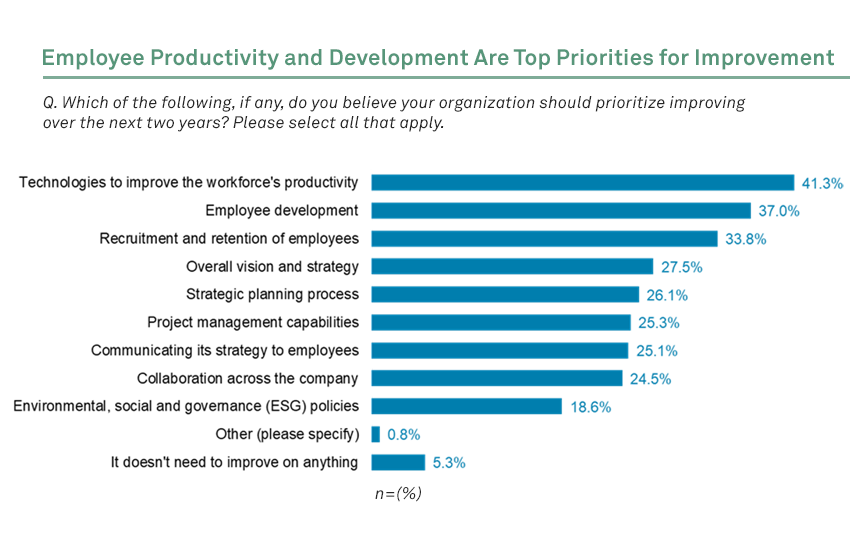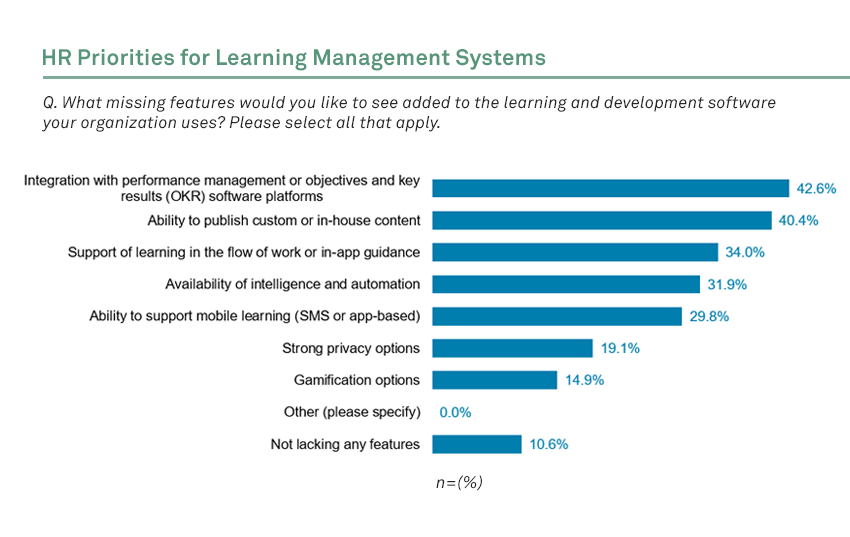
Frontline workers are integral to an organization’s digital transformation in this rapidly evolving business environment. A comprehensive learning and development (L&D) strategy and a technology-focused approach are key to digitizing the frontline operations, write Raúl Castañón-Martínez and Conner Forrest, senior analysts at 451 Research, a part of S&P Global Market Intelligence.
Investing in productivity
Digitization of frontline operations is about more than just person-to-person communications. It also involves large-scale transformation of routine tasks performed by frontline workers.
In building a digitized workforce, whether frontline or in-office workers, companies are not losing sight of the fact that L&D initiatives contribute to improved employee productivity. According to a recent 451 Alliance survey, technologies to improve workforce productivity (41%) and employee development (37%) were the top items that respondents feel their organization should prioritize improving over the next two years.

In a different survey conducted with HR professionals, integration with performance management or objectives and key results (OKR) software platforms was the top priority and feature when it comes to learning management system (LMS) software and other training tools.

Keeping it relevant
In other words, companies are looking to quantify the return on investment of their L&D initiatives through integration of performance management and OKR platforms. This inevitably closes the gap between learning and practice. For frontline operations, this can mean aligning customer service and customer NPS scores with company standards.
Custom Learning Content
Meanwhile, the ability to publish custom or in-house content was the second priority cited by HR respondents for LMS software and training tools.
This is especially crucial for frontline operations that demand work scenario simulations, which tend to be specific. Companies may look for a content library provider with separate offerings for frontline and desk workers, while a few vendors have come up with modules that cater to in-house content creation.
Other than that, in-app guidance and mobile-based learning are the emerging key training requirements for the frontline workforce – for instance, in on-the-job training. This training can be facilitated by digital assistants and chat bots, while L&D platforms that deliver content in small chunks work better for workers who can attend to them in between service calls.
Meanwhile, intelligence and automation can be utilized to alert frontline workers about an incoming refresher course or the renewal of a certification.
LMS vendors are responding with new products to better serve the L&D of frontline workers as more frontline operations become digitized. Here is a list of the vendors in four buckets of services:
Personalized content
ShowHow – Users are able to author their own scenario training modules with storyboarding, video editing, voice recording, virtual reality, 360-degree video and built-in quizzes.
AI-enabled
Drishti – An AI video analytics and computer-vision vendor that taps into datasets from video cameras around factory floors to derive quality improvement and accelerate training.
Learning in the flow of work and in-app guidance
Beekeeper, Orion Labs and Unvired – By deploying digital assistants and chat bots, these platforms offer voice-activated applications with step-by-step guidance.
Mobile-first
Skyllful – A mobile-based digital adoption platform with use cases for on-the-job training for retail workers, truck drivers and service technicians.
Arist – Boston-based startup that provides SMS-based training for in-office and frontline workers.
Want insights on workforce productivity and collaboration trends delivered to your inbox? Join the 451 Alliance.

